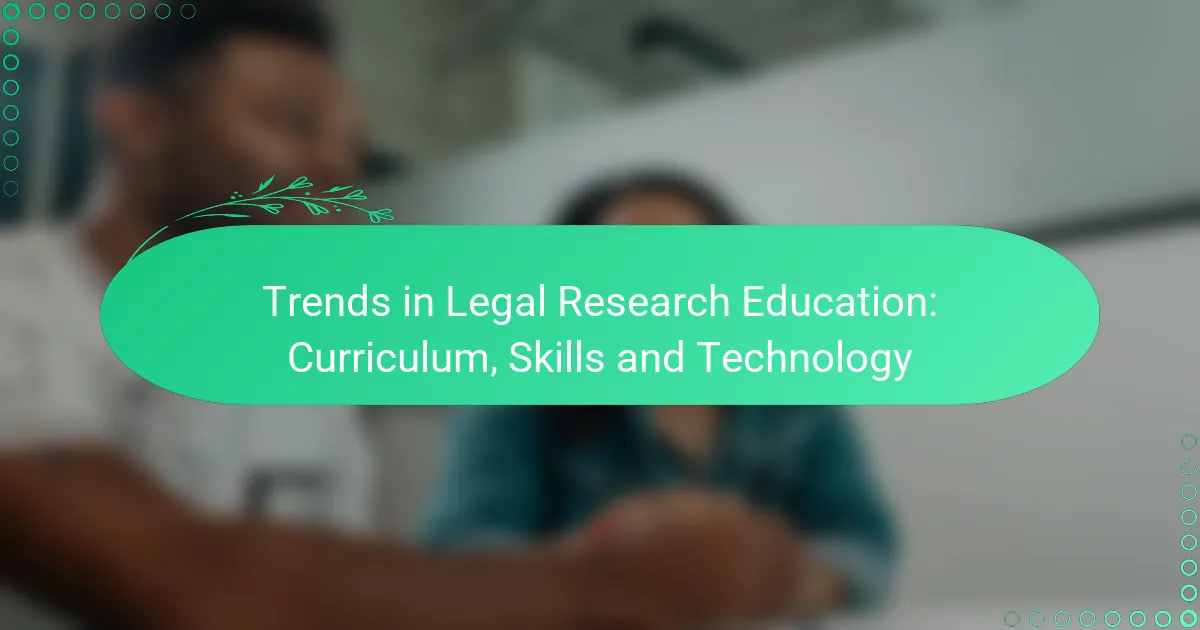In the UK, legal research education is evolving to incorporate technology, enhance practical skills, and embrace interdisciplinary approaches, ensuring that law students are well-equipped for the modern legal landscape. Advanced tools and platforms are revolutionizing the way legal research is taught, making the process more efficient and accessible. As a result, aspiring legal professionals must develop critical thinking, legal writing skills, and a strong understanding of diverse research methodologies to navigate complex legal challenges effectively.

What are the current trends in legal research education in the UK?
Current trends in legal research education in the UK focus on integrating technology, enhancing practical skills, and adopting interdisciplinary approaches. These trends aim to prepare law students for the evolving demands of the legal profession.
Integration of technology in curriculum
The integration of technology in the legal research curriculum is becoming essential. Law schools are incorporating tools such as legal databases, artificial intelligence, and data analytics to enhance research capabilities. This shift helps students become proficient in using modern legal technologies that are increasingly prevalent in practice.
For example, students may learn to navigate platforms like Westlaw or LexisNexis, which provide access to a vast array of legal resources. Familiarity with these tools is crucial, as many employers expect graduates to be adept at using technology to streamline research processes.
Focus on practical skills development
There is a strong emphasis on developing practical skills within legal research education. Programs are increasingly incorporating experiential learning opportunities, such as internships and clinical placements, where students can apply their research skills in real-world settings. This hands-on experience is vital for bridging the gap between theoretical knowledge and practical application.
Additionally, workshops and simulations are often included in the curriculum to help students practice drafting legal documents and conducting effective research strategies. These practical components prepare students for the challenges they will face in their legal careers.
Emphasis on interdisciplinary approaches
Legal research education is increasingly embracing interdisciplinary approaches, recognizing that law intersects with various fields such as technology, business, and social sciences. This trend encourages students to explore how different disciplines influence legal issues and research methodologies.
For instance, a law student might study the implications of technology on privacy laws or the impact of economic theories on regulatory frameworks. By fostering an interdisciplinary perspective, law schools equip students with a broader understanding of the complexities involved in legal research and practice.

How is technology shaping legal research education?
Technology is fundamentally transforming legal research education by integrating advanced tools and platforms that enhance learning and efficiency. Students and professionals now have access to sophisticated resources that streamline the research process and improve legal analysis.
Use of AI tools like Westlaw Edge
AI tools such as Westlaw Edge are revolutionizing legal research by providing predictive analytics and enhanced search capabilities. These tools can analyze vast amounts of legal data quickly, allowing users to find relevant case law and statutes with greater accuracy.
Legal educators are incorporating these AI tools into their curricula, teaching students how to leverage technology for efficient research. Familiarity with AI in legal contexts prepares students for modern practice, where such tools are increasingly standard.
Incorporation of legal research databases
Legal research databases are essential components of legal education, offering access to a wide range of primary and secondary legal materials. Platforms like LexisNexis and Bloomberg Law provide comprehensive databases that students can use for assignments and practical exercises.
Instructors emphasize the importance of mastering these databases, as they are critical for effective legal research. Students are often required to complete projects that involve using these databases to simulate real-world legal research scenarios.
Online learning platforms for remote access
Online learning platforms have become vital for legal research education, especially in a post-pandemic world. These platforms enable students to access courses and resources from anywhere, facilitating flexible learning environments.
Many institutions are adopting hybrid models that combine online and in-person instruction, allowing students to engage with legal research tools remotely. This approach not only broadens access but also prepares students for the increasingly digital nature of legal practice.

What skills are essential for legal research professionals?
Legal research professionals must possess a combination of critical thinking, legal writing proficiency, and familiarity with various research methodologies. These skills enable them to analyze complex legal issues, communicate findings effectively, and utilize appropriate research techniques.
Critical thinking and analytical skills
Critical thinking and analytical skills are vital for legal research professionals as they allow for the evaluation of legal arguments and the identification of relevant precedents. Professionals should be able to dissect complex legal issues, weigh evidence, and draw logical conclusions based on their findings.
To enhance these skills, practitioners can engage in activities such as case analysis, participating in moot court competitions, or studying landmark cases. These experiences foster a deeper understanding of legal reasoning and improve the ability to apply critical analysis in real-world scenarios.
Proficiency in legal writing
Proficiency in legal writing is essential for conveying research findings clearly and persuasively. Legal professionals must be adept at drafting various documents, including memos, briefs, and pleadings, ensuring that their arguments are well-structured and supported by evidence.
To improve legal writing skills, individuals can practice writing regularly, seek feedback from peers or mentors, and study exemplary legal documents. Familiarity with citation styles, such as Bluebook or ALWD, is also crucial for maintaining professionalism and accuracy in legal writing.
Familiarity with research methodologies
Familiarity with research methodologies is important for legal research professionals to effectively locate and analyze legal information. This includes understanding how to use both traditional resources, like law libraries, and modern tools, such as online databases and legal research software.
Professionals should be well-versed in various research techniques, including statutory research, case law analysis, and secondary source evaluation. Regular training on new technologies and methodologies can help keep skills current and enhance overall research efficiency.

How do UK law schools adapt their curriculum?
UK law schools adapt their curriculum by integrating practical skills and contemporary legal issues, ensuring that students are well-prepared for the evolving legal landscape. This involves collaboration with legal practitioners, incorporation of case studies, and regular updates based on industry needs.
Collaboration with legal practitioners
Collaboration with legal practitioners is essential for UK law schools to align their curriculum with real-world legal practices. Schools often invite legal professionals to contribute to course design, guest lecture, or mentor students, providing insights into current legal challenges and practices.
This partnership helps students gain practical experience and understand the expectations of employers. For example, workshops led by solicitors or barristers can enhance students’ skills in negotiation, advocacy, and legal writing.
Incorporation of case studies
Incorporating case studies into the curriculum allows students to analyze real legal scenarios, fostering critical thinking and problem-solving skills. By examining landmark cases or recent legal disputes, students learn to apply theoretical knowledge to practical situations.
Case studies often cover a range of topics, from contract law to human rights issues, providing a comprehensive understanding of the legal system. This method encourages active learning and helps students develop a nuanced perspective on legal issues.
Regular curriculum updates based on industry needs
Regular curriculum updates are crucial for UK law schools to remain relevant in a rapidly changing legal environment. Schools typically review and revise their programs annually, taking into account feedback from alumni, employers, and industry trends.
These updates may include new modules on emerging areas of law, such as technology and data protection, ensuring that students are equipped with the latest knowledge and skills. Engaging with legal associations and attending industry conferences can also inform these curriculum changes, keeping the education aligned with market demands.

What are the prerequisites for legal research education?
Legal research education typically requires foundational knowledge and skills that prepare students for advanced study. Key prerequisites include obtaining an undergraduate law degree and possessing basic computer literacy to navigate legal databases and resources effectively.
Undergraduate law degree requirements
Most legal research programs require an undergraduate law degree as a foundational step. This degree provides essential knowledge of legal principles, theories, and systems, which are crucial for effective research. In many jurisdictions, this degree is a prerequisite for admission to law school or advanced legal studies.
Students should focus on courses that enhance critical thinking, analytical skills, and an understanding of legal frameworks. Engaging in internships or practical experiences during this time can also provide valuable insights into the legal research process.
Basic computer literacy
Basic computer literacy is essential for success in legal research education. Students must be comfortable using computers, navigating the internet, and utilizing various software applications, particularly legal research databases such as Westlaw or LexisNexis.
Familiarity with word processing, spreadsheets, and presentation software is also beneficial. Developing these skills early on can streamline the research process and enhance overall productivity in legal studies.
